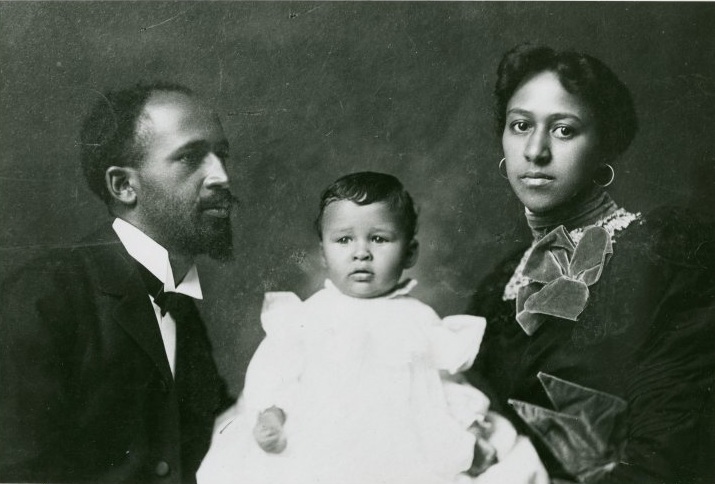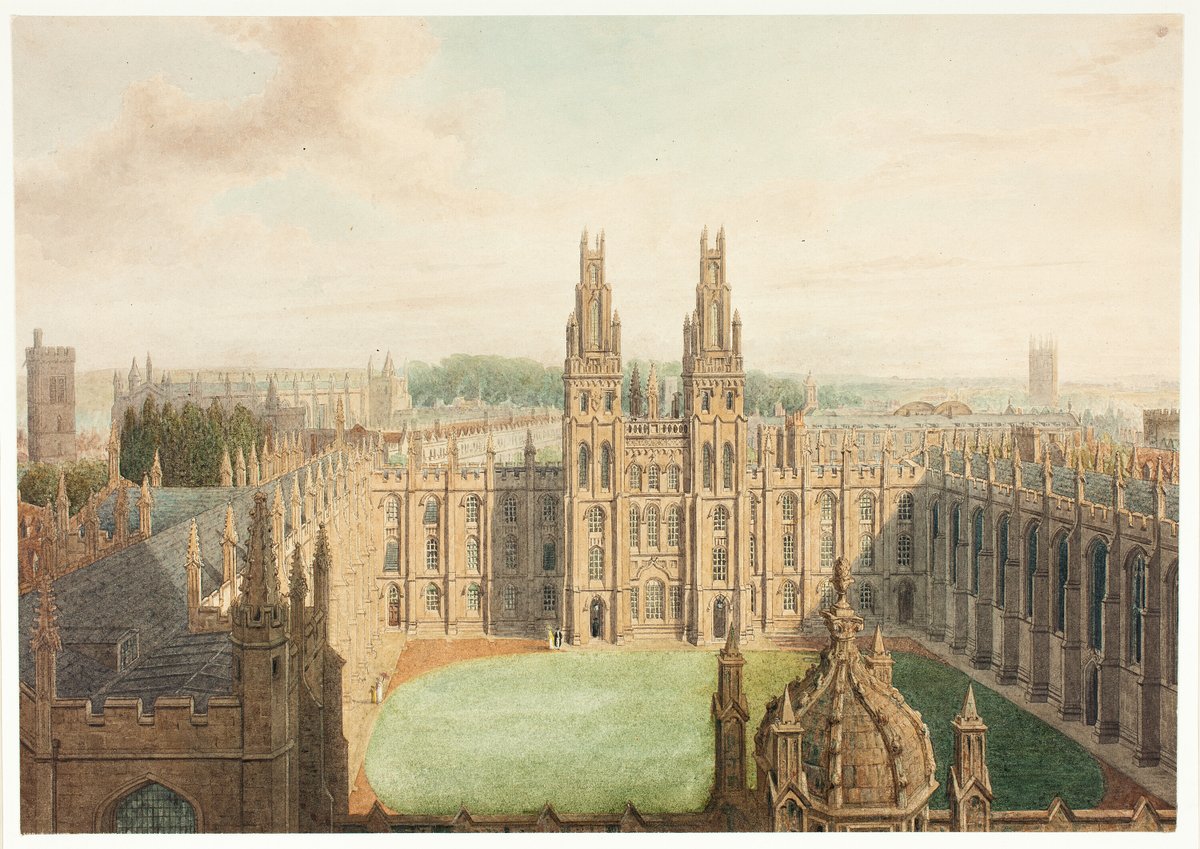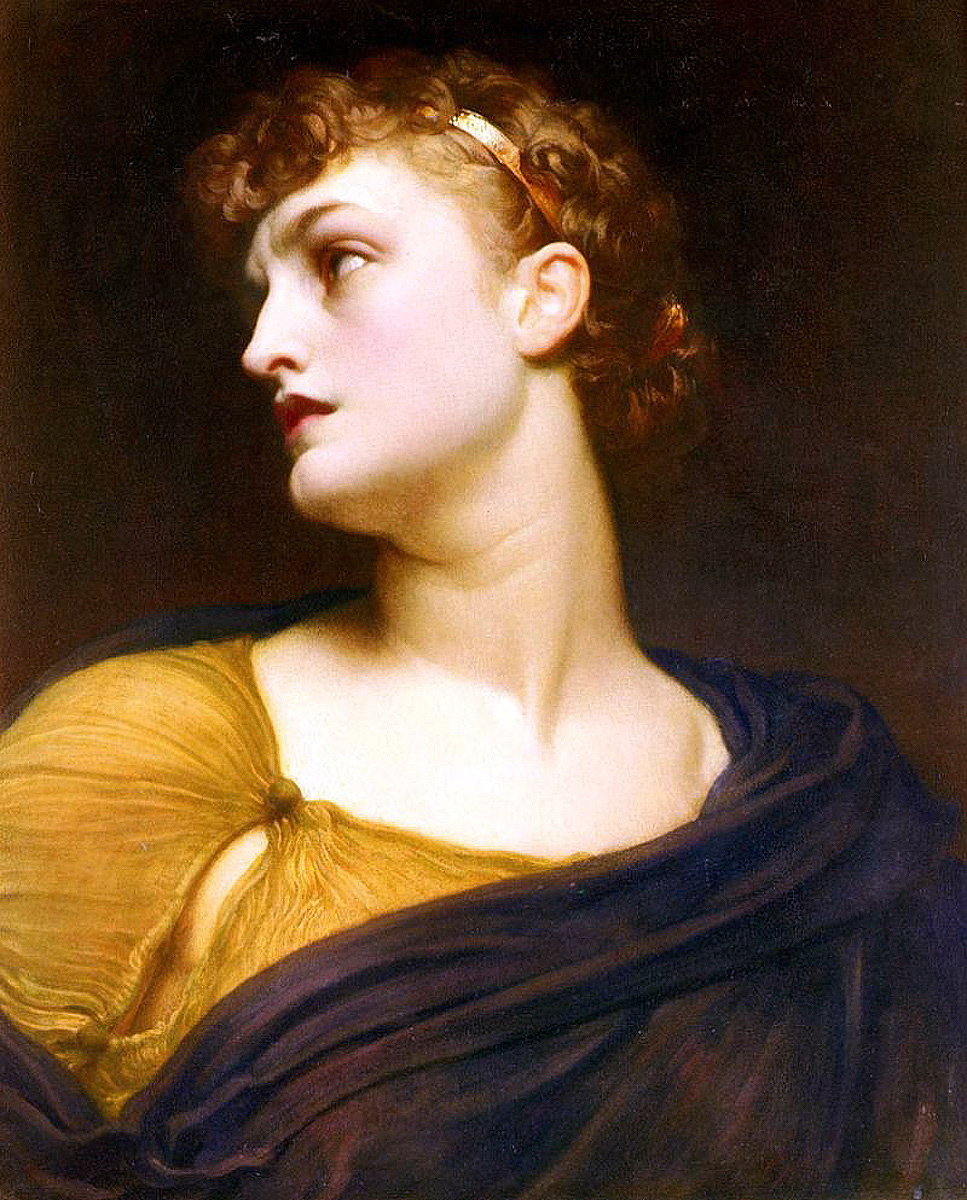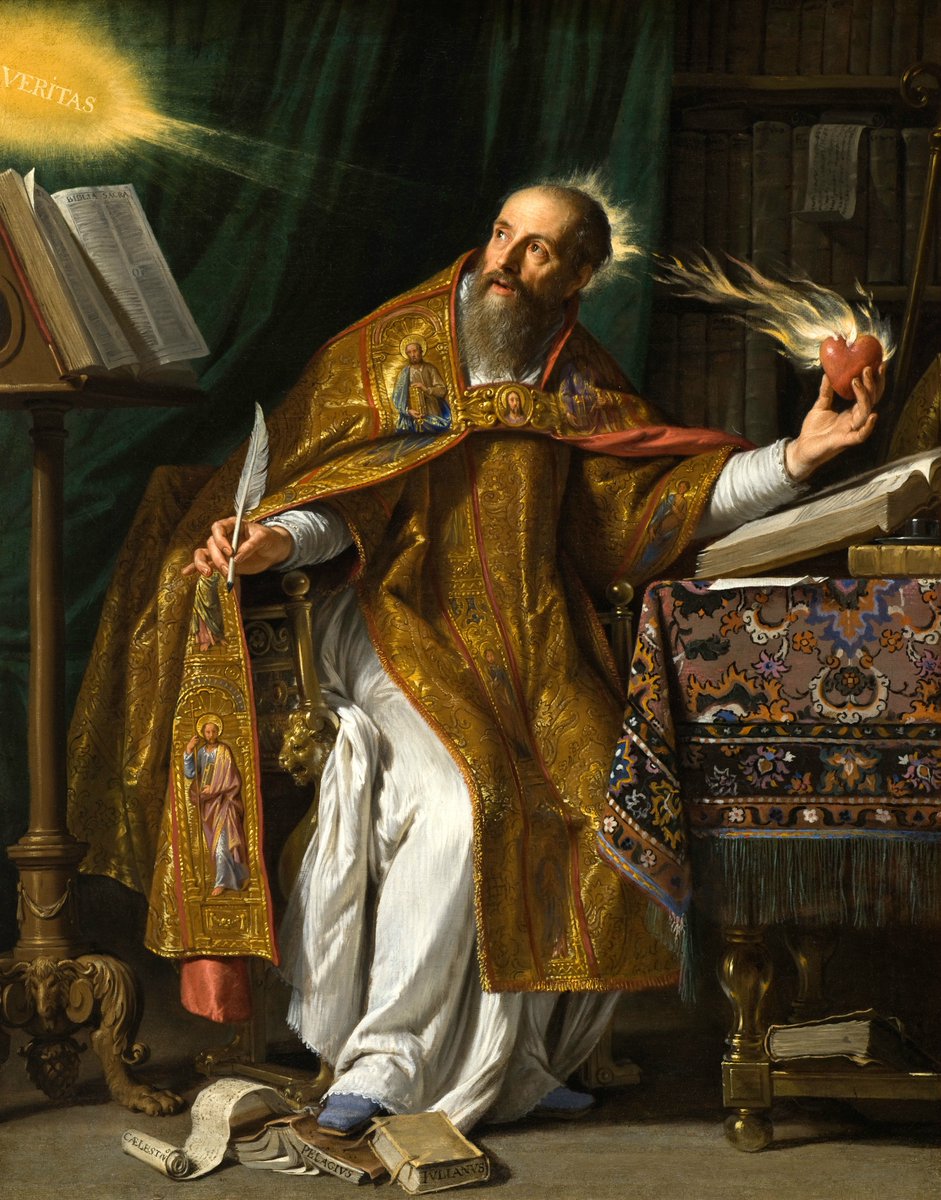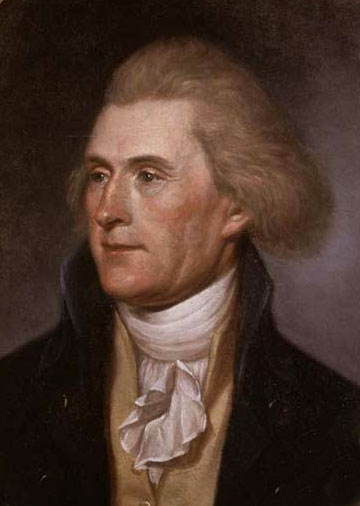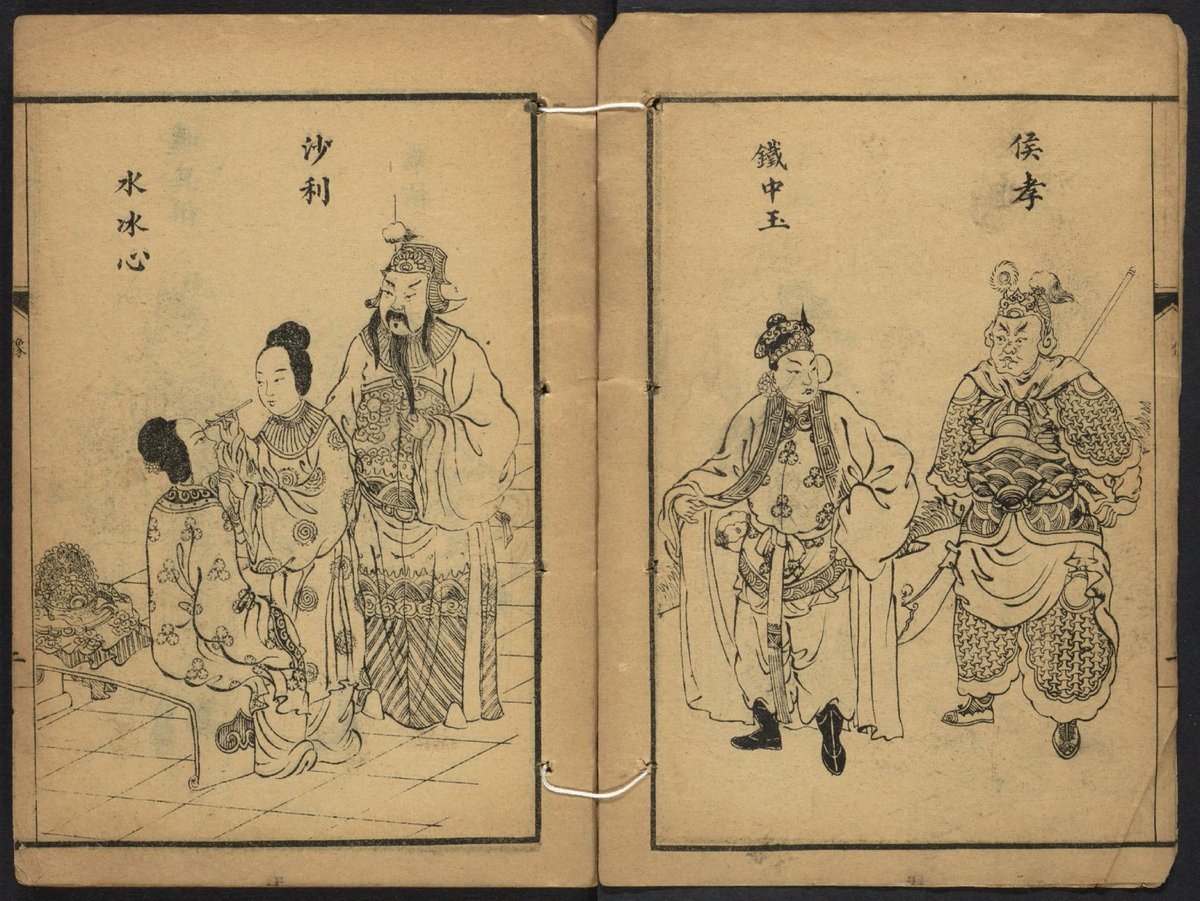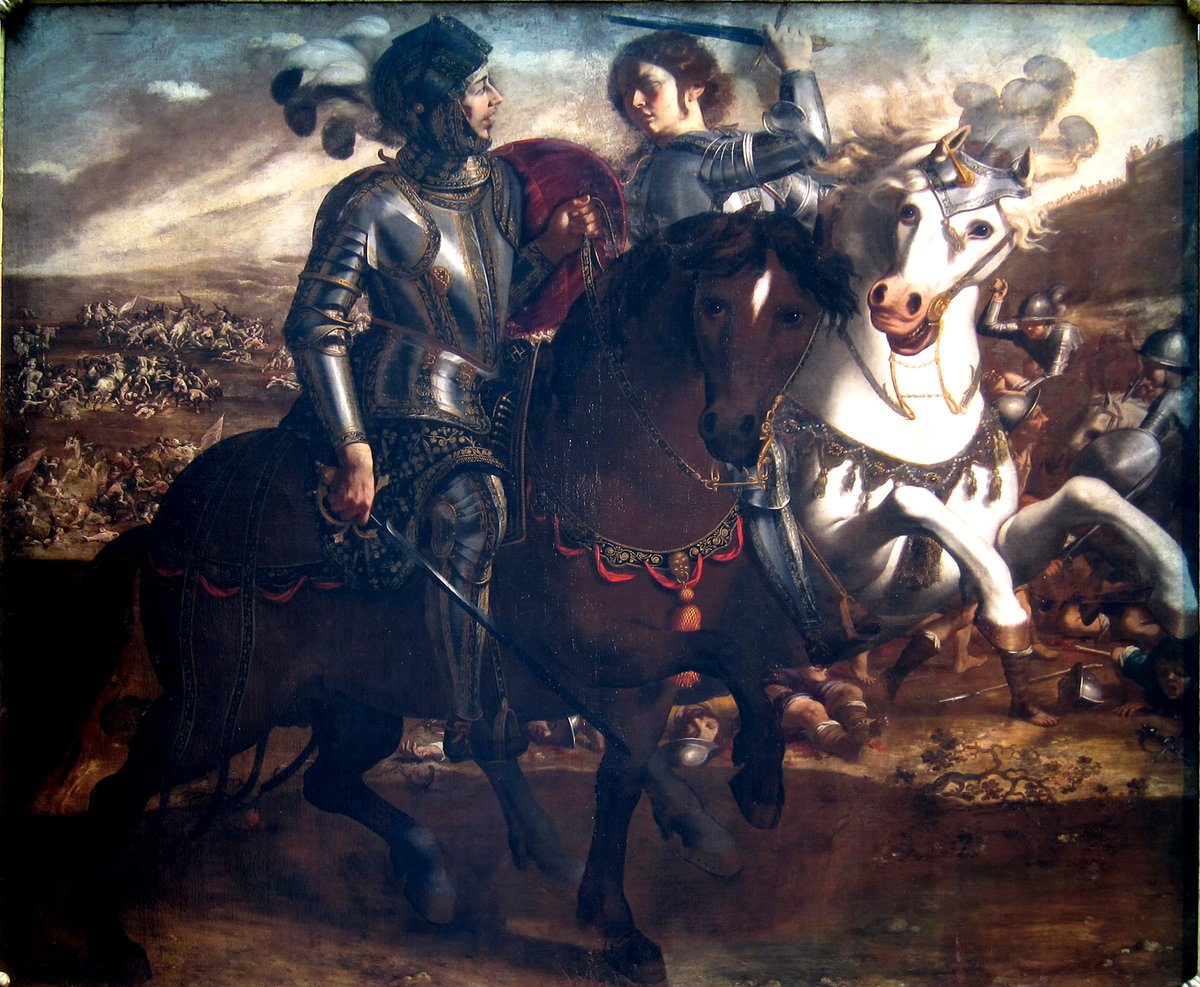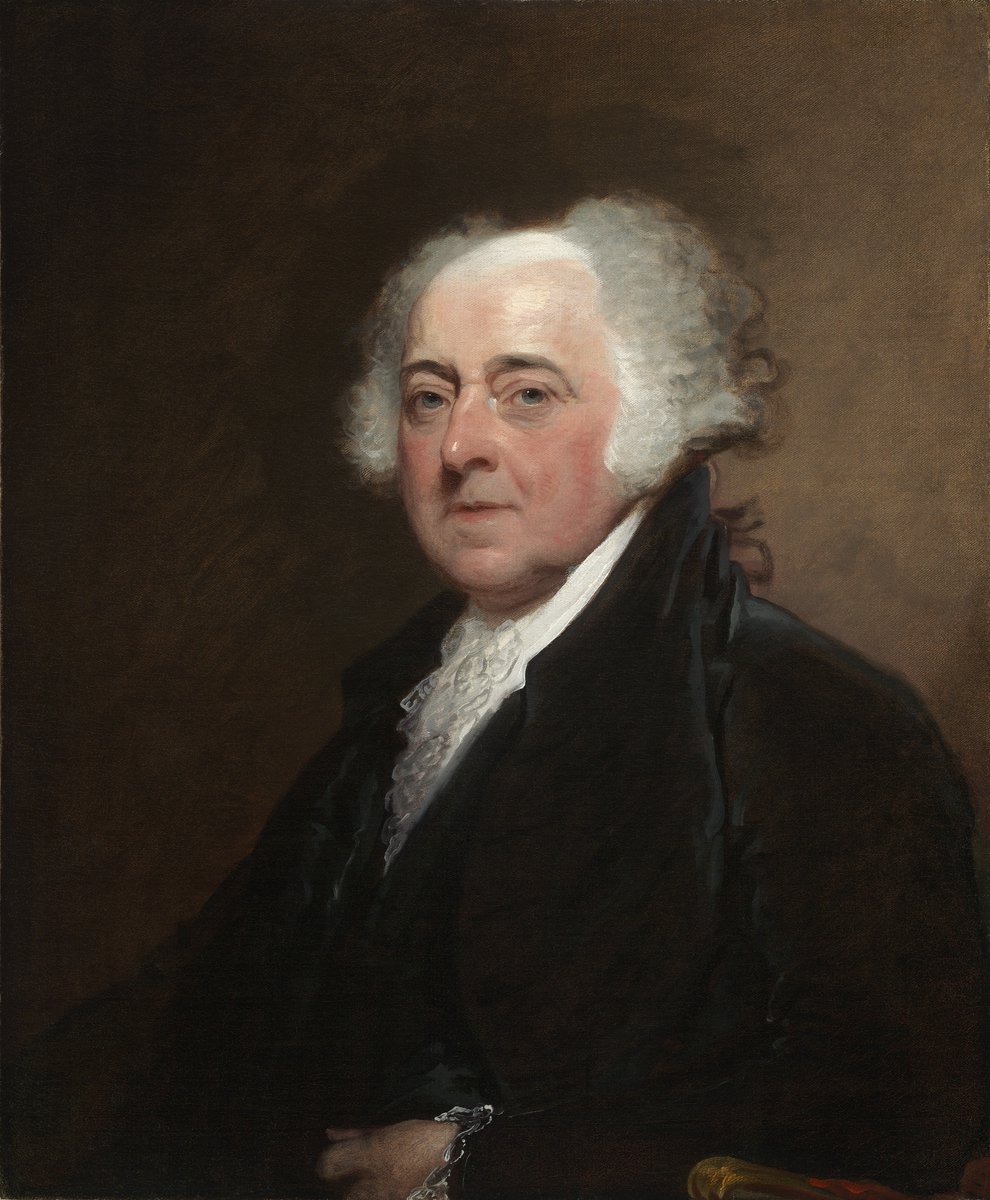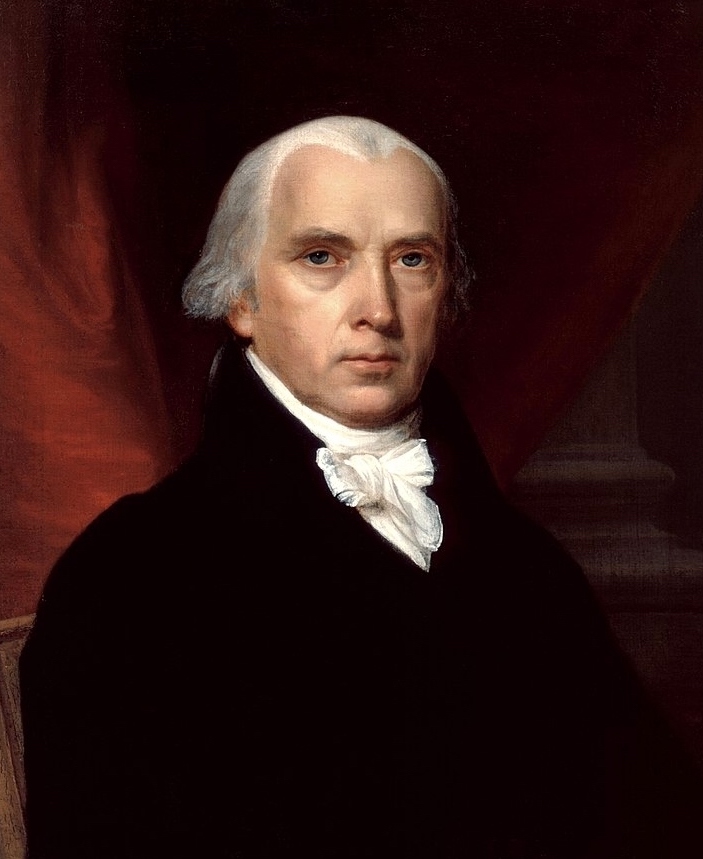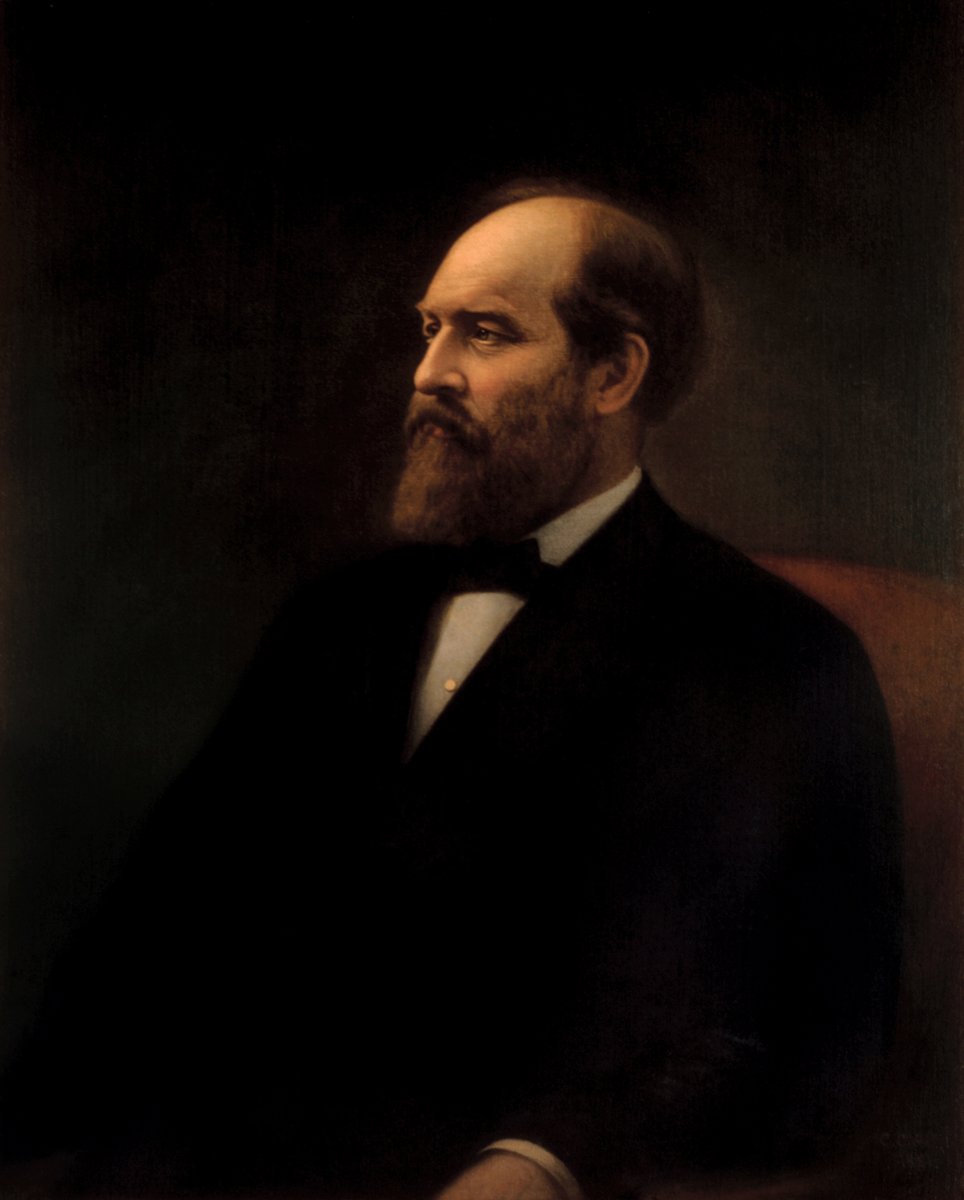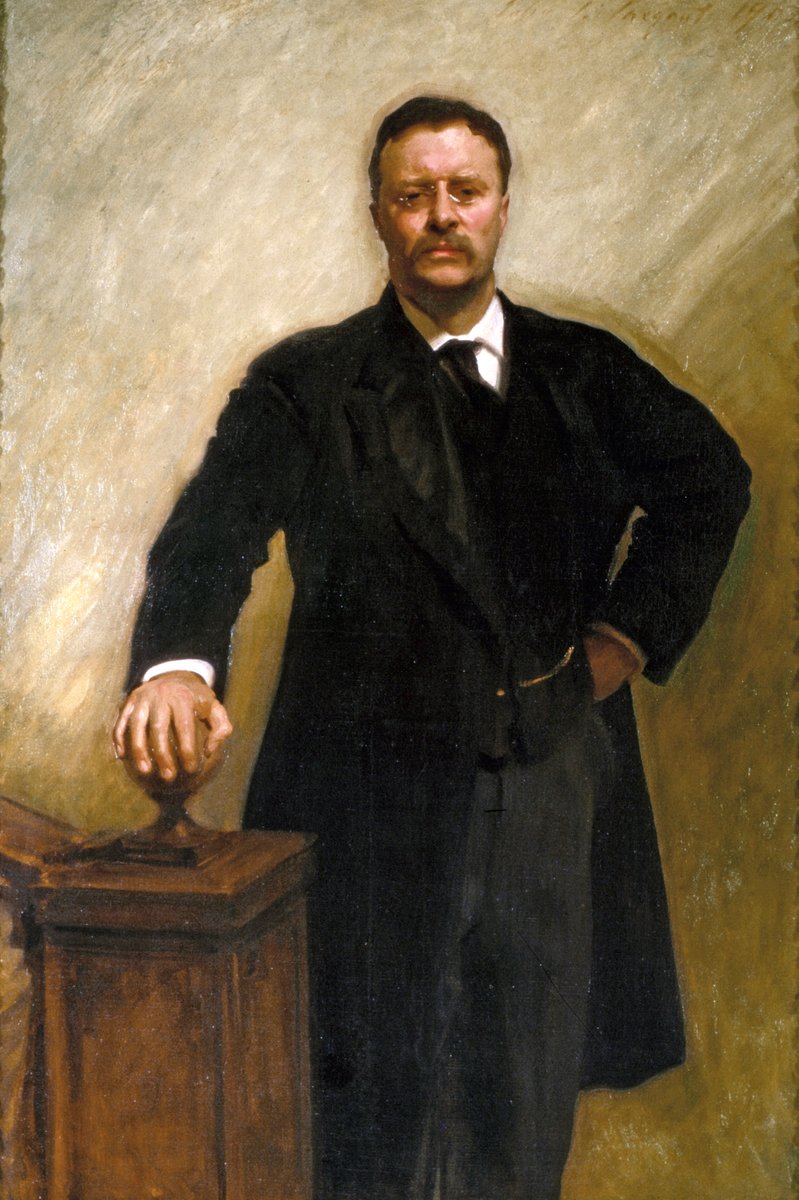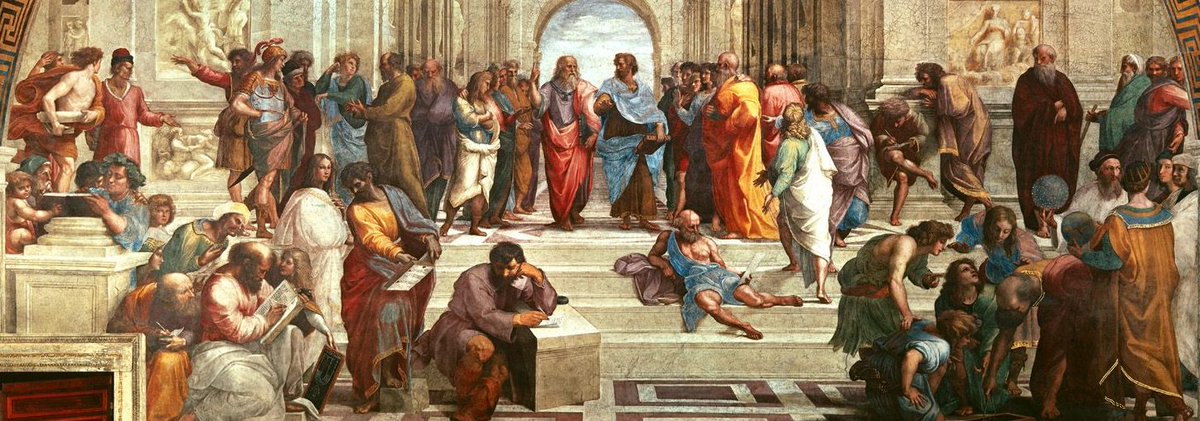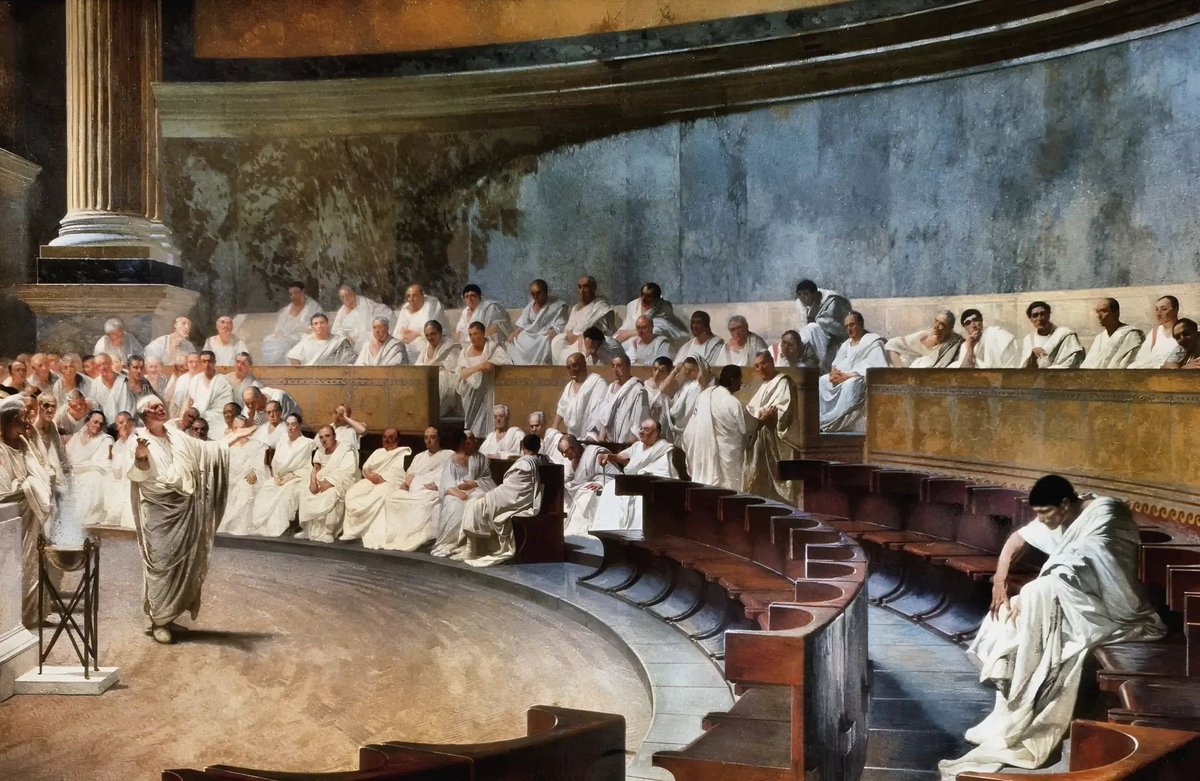A Thread on the Lost Libraries of the Ancient World:
What We Lost and How We Lost Them.
1. The Library of Alexandria
The most famous library of antiquity -- and the most lied about...
What We Lost and How We Lost Them.
1. The Library of Alexandria
The most famous library of antiquity -- and the most lied about...
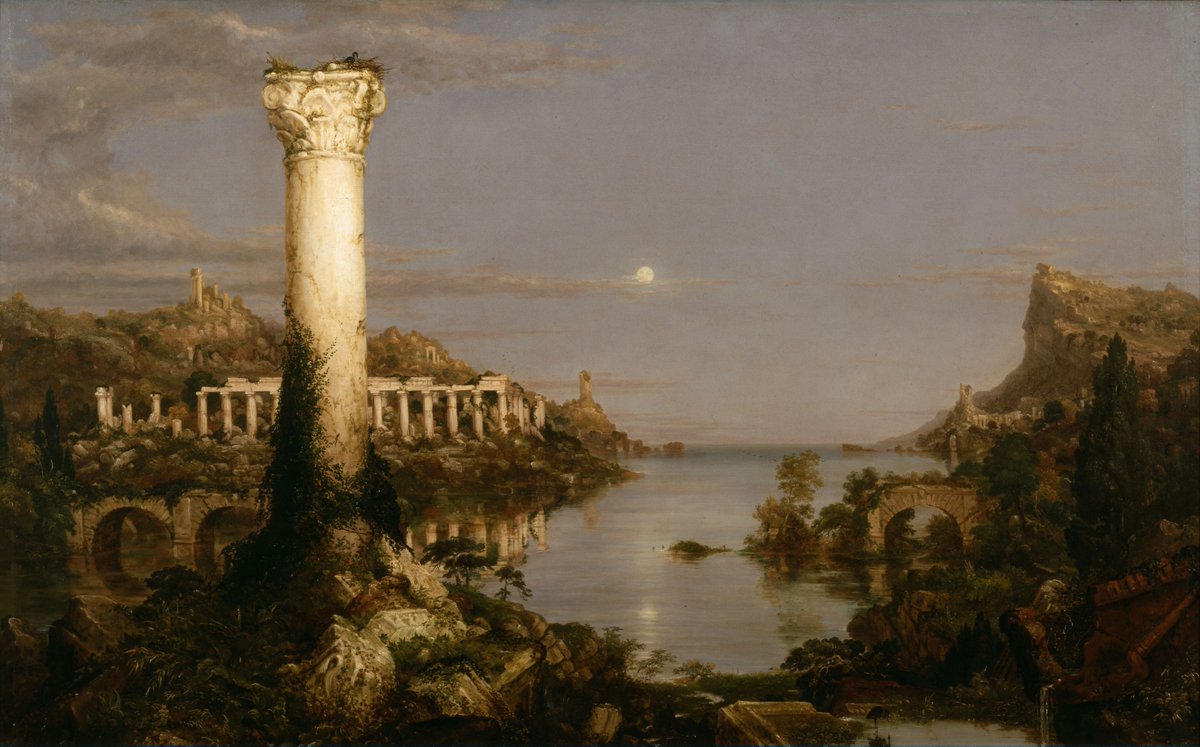
After the Ptolemies took over Egypt in 305 BC, they established a scholarly institute called the Mouseion of Alexandria.
The Library was the collection supporting the Mouseion's scholars.
The goal was to have a copy of every important work of Greek literature in existence.
The Library was the collection supporting the Mouseion's scholars.
The goal was to have a copy of every important work of Greek literature in existence.

~145 BC, Ptolemy VIII Euergetes II, in a political fit, expelled all the scholars.
They were replaced with political hacks, who viewed the Mouseion as a sinecure.
Without real scholars using it, the Library limped on as a zombie institution for a couple of centuries.
They were replaced with political hacks, who viewed the Mouseion as a sinecure.
Without real scholars using it, the Library limped on as a zombie institution for a couple of centuries.

There are many myths re: the Library's destruction.
But...
Julius Caesar didn't burn it down in 48 BC (there was a fire but not near the Mouseion).
And the Library was long gone before Christians (in AD391) or Muslims (in AD693) could've burned it down.
So, what did happen?
But...
Julius Caesar didn't burn it down in 48 BC (there was a fire but not near the Mouseion).
And the Library was long gone before Christians (in AD391) or Muslims (in AD693) could've burned it down.
So, what did happen?

In AD272, the Broucheion quarter (the Library's home) was razed when Aurelian retook Alexandria.
In accounts of this event, there's no mention of any Library, suggesting it was already gone.
How could this be?
Papyrus has a short life; maintaining scrolls is a commitment.
In accounts of this event, there's no mention of any Library, suggesting it was already gone.
How could this be?
Papyrus has a short life; maintaining scrolls is a commitment.

You're always re-copying your scrolls.
Lose your budget? Your scrolls are dust in <100 yrs, unless you sell them.
The Library of Alexandria most likely slowly died this way.
No grand villain. Just time & indifference.
But it's not the only ancient library worth mourning...
Lose your budget? Your scrolls are dust in <100 yrs, unless you sell them.
The Library of Alexandria most likely slowly died this way.
No grand villain. Just time & indifference.
But it's not the only ancient library worth mourning...

2. Library of Ashurbanipal (612 BC)
The great library of the last of the Neo-Assyrian kings in Ninevah, it housed more than 30,000 clay tablets.
Among its treasures were the Epic of Gilgamesh, the Enūma Eliš, and other Babylonian (and older) histories and religious texts.
The great library of the last of the Neo-Assyrian kings in Ninevah, it housed more than 30,000 clay tablets.
Among its treasures were the Epic of Gilgamesh, the Enūma Eliš, and other Babylonian (and older) histories and religious texts.

What happened?
In 612 BC, Ninevah was destroyed by a coalition of Babylonians, Scythians, and Medes.
While some of the library's clay tablets survived the ensuing fire and were later recovered by 19th-century archeologists, it is believed countless wax tablets were lost.
In 612 BC, Ninevah was destroyed by a coalition of Babylonians, Scythians, and Medes.
While some of the library's clay tablets survived the ensuing fire and were later recovered by 19th-century archeologists, it is believed countless wax tablets were lost.

4. The Library of Aristotle
The great Greek philosopher founded a philosophy school at the Lyceum in Athens, ~335 BC.
Its library was 10,000+ scrolls, and it included all of Aristotle's works (likely the lost Dialogues) and perhaps lost works by pre-Socratic philosophers.
The great Greek philosopher founded a philosophy school at the Lyceum in Athens, ~335 BC.
Its library was 10,000+ scrolls, and it included all of Aristotle's works (likely the lost Dialogues) and perhaps lost works by pre-Socratic philosophers.

What happened?
The Lyceum's library was eventually inherited by the scholar Neleus, who allegedly took it with him when he moved to Asia Minor.
From there, we lose track, though it is likely the collection was broken up, some maybe eventually reaching Pergamum or Alexandria.
The Lyceum's library was eventually inherited by the scholar Neleus, who allegedly took it with him when he moved to Asia Minor.
From there, we lose track, though it is likely the collection was broken up, some maybe eventually reaching Pergamum or Alexandria.

5. The Library of Pergamum
A century after the Ptolemies established the Library of Alexandria, King Eumenes II of Pergamum (a Greek city in Anatolia) sought to create a rival.
His library was massive -- second only to Alexandria, and its collection was a near copy.
A century after the Ptolemies established the Library of Alexandria, King Eumenes II of Pergamum (a Greek city in Anatolia) sought to create a rival.
His library was massive -- second only to Alexandria, and its collection was a near copy.

What happened?
When Rome took over Pergamum in 133 BC, the Library lost its sponsor.
Its scrolls were likely gradually dispersed to other libraries.
According to Plutarch, Mark Antony gifted what was left to Cleopatra in 43 BC, though some scholars question this.
When Rome took over Pergamum in 133 BC, the Library lost its sponsor.
Its scrolls were likely gradually dispersed to other libraries.
According to Plutarch, Mark Antony gifted what was left to Cleopatra in 43 BC, though some scholars question this.

6. Villa of the Papyri
Once the Herculaneum vacation home of Julius Caesar's father-in-law, it is considered to be one of the most luxurious private homes in all of 1st-century Rome.
It also was home to an unusually large private library.
Once the Herculaneum vacation home of Julius Caesar's father-in-law, it is considered to be one of the most luxurious private homes in all of 1st-century Rome.
It also was home to an unusually large private library.

What happened?
The Vesuvius eruption (AD79) buried it in volcanic ash.
This carbonized many of the scrolls, and archeologists are now using technology to decipher them.
Mostly Epicurean tracts have been uncovered so far, but there is hope other lost philosophy works are there.
The Vesuvius eruption (AD79) buried it in volcanic ash.
This carbonized many of the scrolls, and archeologists are now using technology to decipher them.
Mostly Epicurean tracts have been uncovered so far, but there is hope other lost philosophy works are there.

7. Library of Celsus
In Ephesus, it was built ~ AD 110 as a funerary monument by a Roman consul for his father, who was buried underneath the library.
It boasted Rome's largest collection behind Alexandria and Pergamum, a healthy endowment, and was open to the public.
In Ephesus, it was built ~ AD 110 as a funerary monument by a Roman consul for his father, who was buried underneath the library.
It boasted Rome's largest collection behind Alexandria and Pergamum, a healthy endowment, and was open to the public.

What happened?
The library's collection was destroyed in a fire in AD 262.
The cause of the fire is disputed.
According to some accounts, the fire was caused by a massive earthquake; others blame it on invading Goths.
The library's collection was destroyed in a fire in AD 262.
The cause of the fire is disputed.
According to some accounts, the fire was caused by a massive earthquake; others blame it on invading Goths.

8. Library of Pantainos
Built ~AD 100 by the Athenian philosopher Titus Flavius Pantainos, this was a philosophy school and public library.
Members of the Pantainos clan were associated with Stoicism, so it perhaps held the lost works of Zeno, Chrysippus, & others.
Built ~AD 100 by the Athenian philosopher Titus Flavius Pantainos, this was a philosophy school and public library.
Members of the Pantainos clan were associated with Stoicism, so it perhaps held the lost works of Zeno, Chrysippus, & others.

What happened?
In AD 267, the Heruli, a Germanic tribe that had invaded the Balkans, sacked Athens, destroying nearly every major building, including Pantainos's library.
In AD 267, the Heruli, a Germanic tribe that had invaded the Balkans, sacked Athens, destroying nearly every major building, including Pantainos's library.

9. Hadrian's Library
In AD123, Roman Emperor Hadrian commissioned the construction of a major library on the Acropolis of Athens.
With the decline of Alexandria and Pergamum, it was to be a major repository of Greco-Roman literature as well as imperial records.
In AD123, Roman Emperor Hadrian commissioned the construction of a major library on the Acropolis of Athens.
With the decline of Alexandria and Pergamum, it was to be a major repository of Greco-Roman literature as well as imperial records.

What happened?
Hadrian's Library was another casualty of the devastating Herulian invasion of AD 267 that destroyed much of Athens and the Acropolis.
Its ruins are still visible to this day.
Hadrian's Library was another casualty of the devastating Herulian invasion of AD 267 that destroyed much of Athens and the Acropolis.
Its ruins are still visible to this day.

10. Academy of Gondishapur
Located near modern-day Gundeshapur, Iran, this was the intellectual center of the Sasanian Empire ~AD 550.
Khosrau I invited Nestorian and Hellenistic scholars whom the Byzantines exiled to teach and translate Greek and Syriac works into Pahlavi.
Located near modern-day Gundeshapur, Iran, this was the intellectual center of the Sasanian Empire ~AD 550.
Khosrau I invited Nestorian and Hellenistic scholars whom the Byzantines exiled to teach and translate Greek and Syriac works into Pahlavi.

What happened?
By AD 1000, the Academy was in ruins.
While there was no reported catastrophic event, the fall of the Sasanians and the rise of the Abbasids shifted the region's intellectual center to Baghdad.
Its scholars and library probably were relocated there.
By AD 1000, the Academy was in ruins.
While there was no reported catastrophic event, the fall of the Sasanians and the rise of the Abbasids shifted the region's intellectual center to Baghdad.
Its scholars and library probably were relocated there.

11. The House of Wisdom
In the 8th century, the Abbasid dynasty established Baghdad as the center of the Islamic Golden Age.
They sponsored original works in Arabic as well as the collection and translation of works from Greece, Syria, Persia, and India.
In the 8th century, the Abbasid dynasty established Baghdad as the center of the Islamic Golden Age.
They sponsored original works in Arabic as well as the collection and translation of works from Greece, Syria, Persia, and India.

What happened?
In 1258, the Mongols sacked Baghdad, destroying the famed Round City, where the library was located.
According to much later historical accounts (likely taking great poetic license), so many books were tossed into the Tigris, the river ran black with ink.
In 1258, the Mongols sacked Baghdad, destroying the famed Round City, where the library was located.
According to much later historical accounts (likely taking great poetic license), so many books were tossed into the Tigris, the river ran black with ink.

12. Imperial Library of Constantinople
Founded by Constantius II ~AD 350, its mission was to preserve Greco-Roman literary masterpieces on a massive scale.
A majority of the ancient Greek works we have today are due to the preservation efforts of the Imperial Library's scribes.
Founded by Constantius II ~AD 350, its mission was to preserve Greco-Roman literary masterpieces on a massive scale.
A majority of the ancient Greek works we have today are due to the preservation efforts of the Imperial Library's scribes.

Papyrus scrolls were extremely fragile, so the main task of this library was to transfer works to more durable parchment.
Resources were limited, so priority was given to older Greek works, like Homer, with newer and more obscure works unfortunately falling by the wayside.
Resources were limited, so priority was given to older Greek works, like Homer, with newer and more obscure works unfortunately falling by the wayside.

What happened?
An accidental fire in AD473 destroyed ~120,000 volumes.
Through tireless efforts, parts of the collection were salvaged and preserved for another 1000 years.
But, the sources don't mention the library persisting as a public institution after the 5th century.
An accidental fire in AD473 destroyed ~120,000 volumes.
Through tireless efforts, parts of the collection were salvaged and preserved for another 1000 years.
But, the sources don't mention the library persisting as a public institution after the 5th century.

Some point to the 1204 sack of Constantinople in the 4th Crusade as the official date of the Imperial Library's destruction.
Surely much was lost in the ensuing fires.
But historians suspect the Library as an institution was defunct by then, and its collection dispersed.
Surely much was lost in the ensuing fires.
But historians suspect the Library as an institution was defunct by then, and its collection dispersed.

When faced with the magnitude of what's been lost, it's comforting to imagine a scapegoat:
Barbarians burning what they fear.
It's usually not that simple.
Preserving culture requires constant diligence, tending & defending.
When cultures die, it's usually from indifference.
Barbarians burning what they fear.
It's usually not that simple.
Preserving culture requires constant diligence, tending & defending.
When cultures die, it's usually from indifference.

Thanks for reading.
If you enjoyed this thread, please do me a favor and share the first post, linked below:
If you enjoyed this thread, please do me a favor and share the first post, linked below:
https://twitter.com/CoffeewClassics/status/1762129455747612813
• • •
Missing some Tweet in this thread? You can try to
force a refresh









